#Hawking radiation
Text
New theoretical research by Michael Wondrak, Walter van Suijlekom and Heino Falcke of Radboud University has shown that Stephen Hawking was right about black holes, although not completely. Due to Hawking radiation, black holes will eventually evaporate, but the event horizon is not as crucial as had been believed. Gravity and the curvature of spacetime cause this radiation too. This means that all large objects in the universe, like the remnants of stars, will eventually evaporate.
Using a clever combination of quantum physics and Einstein's theory of gravity, Stephen Hawking argued that the spontaneous creation and annihilation of pairs of particles must occur near the event horizon (the point beyond which there is no escape from the gravitational force of a black hole).
A particle and its anti-particle are created very briefly from the quantum field, after which they immediately annihilate. But sometimes a particle falls into the black hole, and then the other particle can escape: Hawking radiation. According to Hawking, this would eventually result in the evaporation of black holes.
In this new study the researchers at Radboud University revisited this process and investigated whether or not the presence of an event horizon is indeed crucial.
Continue Reading
176 notes
·
View notes
Text
Imagine a greatly simplified universe containing just one lonely spiral galaxy with a supermassive black hole at its center. The outer edge of the universe is constantly expanding outward while the black hole is constantly devouring the galaxy.

All known physical laws apply here. Importantly, the laws of thermodynamics apply so no matter or energy can be created. The black hole at the center will eventually consume all matter while the universal edge will eventually grow to surround the black hole with an infinite expanse of empty space. Then, heat death.
The black hole will eventually evaporate all of its mass away as Hawking radiation and, having successfully cooled all matter down into pure energy, it will blink out of being and the inner terminus of the universe will pop like a soap bubble, its once-massive energy fully spent.
But long before the heat death of the universe, the galaxy will swirl around for billions of years with its inner bulk imploding as though being consumed from within while its outer fringes are simultaneously compressed from without, the very space itself expanding around it. We actually observe something like this effect in other galaxies throughout our own universe. Most galaxies appear to rotate much faster than their apparent mass would allow, so they would seem to have some hidden mass we call dark matter because its existence can only be inferred.
At the same time, some inferred force is also causing the space in between galaxies to expand without actually stretching it, as though new threads are being woven into the fabric of spacetime itself, causing the distance between distant galaxies to naturally increase over time. Cosmologists estimate that this dark energy accounts for the bulk of all mass/energy in the universe, exceeding even dark matter which itself greatly exceeds all observable matter and energy.
But perhaps dark matter is merely a fictious force, an emergent property of dark energy. For although dark energy appears to act only upon empty space whilst dark matter affects gravitationally-bound matter, maybe the only reason dark matter is dark is because it's not matter at all, it's simply the observable effect of dark energy compressing galaxies from outside.
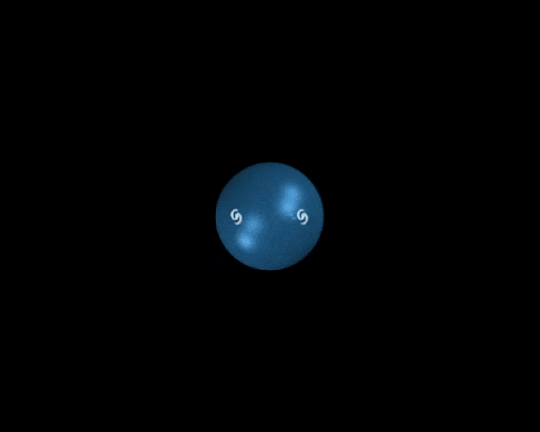
Ultimately, dark energy will expand the empty space between distant galaxies so rapidly that not even light will have enough time to span the gap, meaning distant galaxies will disappear from each other's perspectives and casual observers will see that their galaxy exists alone. So my original proposal isn't so far fetched. It is, in fact, the fate of our own galaxy—and all the other gravitationally-bound galaxies within the Local Group subsequent to their eventual merger with ours. Our distant ancestors may yet occupy a lonely galaxy in a dark void.
As the matter in our Local Group is gradually consumed by the supermassive black hole named Sagittarius A* (read eh-star), objects approaching the event horizon will undergo 'spaghettification' stretching. Even solid objects will be drawn down into threads of matter just one atom thick. Each thread will constitute a one-bit matter stream, yet each bit will preserve the information it carried with it from the farthest reaches of the galaxy. In a sense, the surface of the event horizon measures the state of incoming matter and records that data holographically.
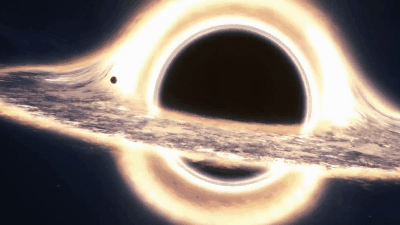
Information, as it happens, is equivalent to energy, comparable to the way matter and energy are mutually exchangeable, so it is therefore bound by the laws of thermodynamics. Information can only be sorted and garbled, never created nor destroyed, not even by a black hole.
Eventually, the holographic information about all the matter that has fallen into a black hole will evaporate away from the event horizon, bit by random bit, as Hawking radiation. Each bit will carry a small amount of the black hole's mass away with it, causing it to shrink. The cosmic microwave background radiation, although too dim and too red-shifted to be seen by human eyes, is still bright and warm enough for now to counteract the paltry Hawking radiation emitted by even very small black holes, so no black hole will be evaporating away anytime soon.
But picture the universe from a singularity's point of view. The holographic image recorded upon the surface of the event horizon is a stained-glass window as seen from the other side, and the scenes it depicts are perfect memories of everything that ever happened in the galaxy. Those images are greatly distorted by the gravitational forces and spaghettification to which all matter succumbed as it plunged into the universal abyss, but with corrective lenses, even gravitational astigmatism may be undone and the holograph's finest details can be revealed.
If a mind could dance upon the surface of the event horizon, watching matter streams go by like a channel-surfer looking for something to watch on T.V., such a mind might be able to perceive the former goings and doings of individual creatures long dead on distant worlds. From the singularity's perspective, this black hole dweller aims the corrective scope at the precise azimuth and elevation to view life from anybody's perspective while turning the focus wheel to scrub through their timeline. The focus wheel would in fact be a time-focus wheel.
Only a godlike mind could conceivably correct such severe distortion, but for all we know, that mind sees the inside of the event horizon projected upon the outside of a globe like an interactive, rewindable recording of real-time satellite feeds in a Google Earth VR interface.

And for all we know, our own minds are peering through such scopes, only the azimuth and elevation is fixed and the focus wheel is motorized so that we experience everything through but one human's perspective along a fixed and finite timeline. What a depressing fate indeed.
The part of me that believes in the free agency of the the soul rejects the implications, but my mind is open to the idea that we're watching events unfold in reverse, that the focus wheel is rolling backwards, and that the black hole is really a white hole spewing information. In that case, we are perceiving the outcomes of our decisions before we make them, guiding us to make the choices that we must in order for our perceived selves to survive from the moment of our death to the moment of our inevitable birth when we will finally avert our gaze.
Thus are we able to predict the past while remembering the future, but with the focus wheel turning backwards, our perception of causality is reversed, making us think we are predicting the future while remembering the past. This part of the plan will be rather controversial.

The heat death of the universe is going to take a very, very long time to reach its conclusion, yet we only have until then to observe everything that has ever mattered throughout all of spacetime. When the soap bubble pops, we're out on our own with the information we collected.
#cosmos#galaxy#universe#black hole#Hawking radiation#heat death of the universe#comic microwave background#dark matter#dark energy#spacetime#spaghettification#event horizon#singularity#black hole information paradox#holographic principle#white hole#time's arrow#causality
28 notes
·
View notes
Photo

Stephen Hawking was born on January 8, 1942. An English theoretical physicist, cosmologist, his scientific works included a collaboration with Roger Penrose on gravitational singularity theorems in the framework of general relativity, and the theoretical prediction that black holes emit radiation, often called Hawking radiation. Hawking was the first to set out a theory of cosmology explained by a union of the general theory of relativity and quantum mechanics. He was a vigorous supporter of the many-worlds interpretation of quantum mechanics. His book A Brief History of Time was on the Sunday Times bestseller list for a record-breaking 237 weeks.
#stephen hawking#physics#quantum mechanics#quantum physics#hawking radiation#a brief history of time#science#science birthdays#science history#on this day#on this day in science history
5 notes
·
View notes
Text
Hawking
I pull away from you,
Further,
Until you decay and cease—
To exist on this plane,
And you freeze and splinter,
Atoms torn from atoms to the breaking point,
The edge,
And then further still until you no longer recall,
Who you are,
What you are,
Then harder still until even black dissipates,
Darkness tears the breath from me,
I pull away from you until I stretch and tear beside you,
Rip into subatomic shreds just by the gravity—
Of what I’ve done to you,
And I hold onto you still while I become consumed,
By the force I’ve thrust into your body,
And even my screams will evaporate,
By the greed, monstrous void that you’ve become,
Pull away,
Break,
And let you feast.
#poetry#my writing#writeblr#physics#astrophysics#cosmology#black hole#astronomy#hawking radiation#stephen hawking
5 notes
·
View notes
Photo
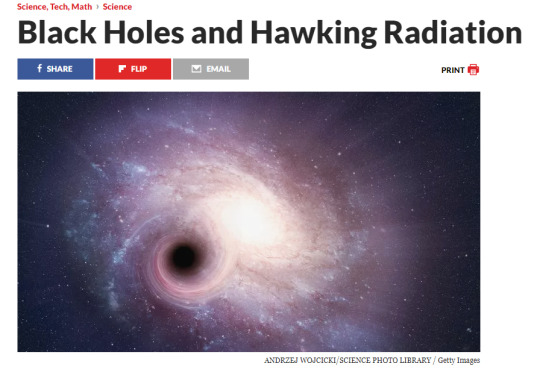
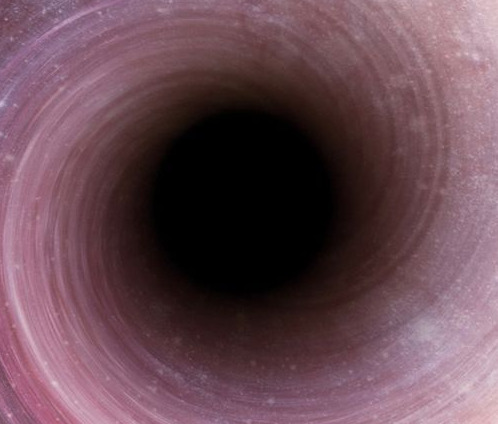

Found it.
6 notes
·
View notes
Text
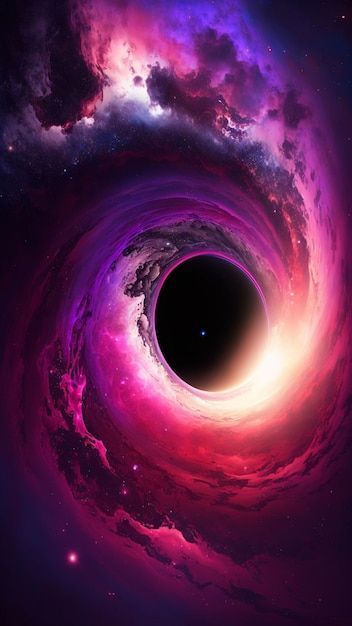
The truth is for anyone who wants to know
#artists on tumblr#photography#cosmos#cosmology#black hole#astrophysics#astronomy#astro observations#astrophotography#stars#galaxies#astronomical objects#interstellar medium#light#electromagnetic waves#general relativity#quantum field theory in curved spacetime#Hawking radiation#gravitational fields#solar masses#dark star#event horizon#albert einstein#stephen hawking
1 note
·
View note
Text
Cosmic vortexes: Black Holes
Introduction:
In the vast expanse of the universe, black holes stand as enigmatic celestial phenomena that continue to captivate astronomers and space enthusiasts alike. These mysterious objects possess immense gravitational pull, devouring everything that comes too close, even light itself. In this blog, we embark on a cosmic journey to explore the fascinating world of black holes, delving into their characteristics, formation, and the implications they have on the cosmos.
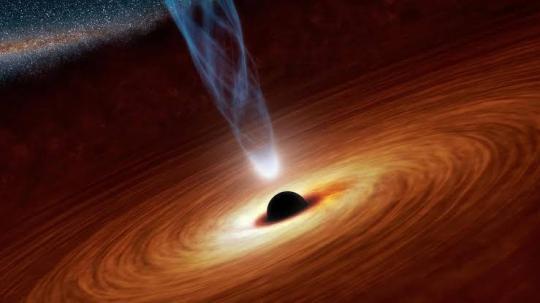
• The Basics of Black Holes:
To comprehend black holes, we must first understand their defining attributes. A black hole is a region in space where the gravita-tional pull is so strong that nothing, not even light, can escape its clutches. This critical point, known as the event horizon, marks the boundary beyond which escape is impossible.
• Formation of Black Holes:
Black holes can form through various processes, with the most common types being stellar black holes and supermassive black holes. Stellar black holes result from the gravitational collapse of massive stars, while supermassive black holes, found at the center of galaxies, grow over time, possibly from the merging of smaller black holes and the accretion of matter.
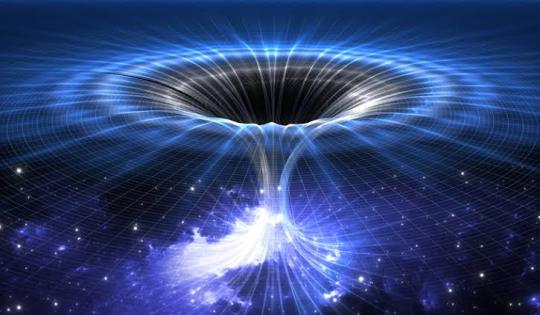
• Singularity:
At the heart of a black hole lies a mind-boggling concept called the "singularity." This is an infinitely dense point where gravity is so intense that the laws of physics as we understand them break down. The understanding of what happens at the singularity is one of the great mysteries of modern physics.

• Event Horizon:
The event horizon is a defining feature of black holes, acting as an invisible barrier beyond which escape is impossible. Any-thing that crosses this point is inevitably pulled into the black hole's core. The larger the black hole, the bigger its event horizon.
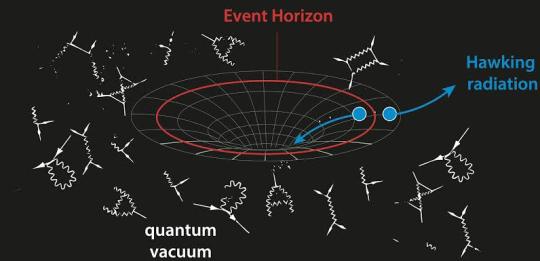
• Hawking Radiation:
Black holes are not entirely invincible; they can, in theory, emit radiation called "Hawking radiation." Proposed by physicist Stephen Hawking, this process suggests that black holes can slowly lose mass and energy over time, leading to their eventual evaporation.
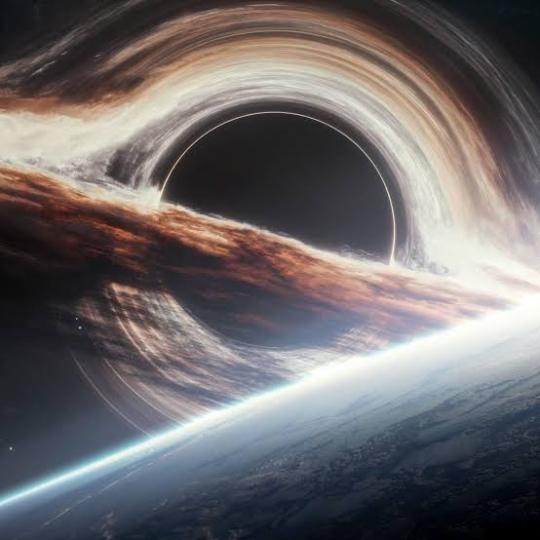
• Interstellar Impact:
Black holes have a significant impact on their surrounding environment. They play a crucial role in shaping galaxies and even influence the motion of nearby stars. Understanding their effects is vital in comprehending the evolution of galaxies and the universe at large.
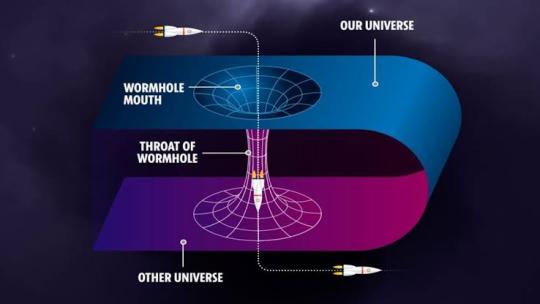
• Wormholes:
A theoretical concept related to black holes is the idea of "wormholes." These hypothetical tunnels through spacetime could potentially connect distant regions of the universe, opening up possibilities for faster-than-light travel. However, the existence of wormholes remains speculative and unproven.
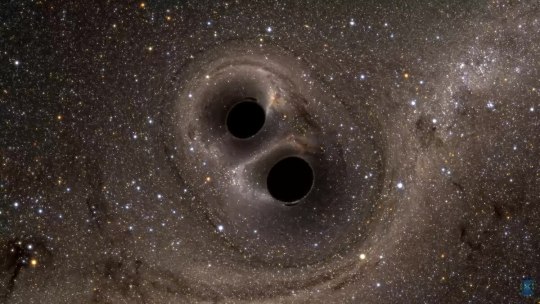
• Black Hole Mergers:
The gravitational interactions between black holes can lead to mesmerizing cosmic events called "black hole mergers." When two black holes spiral toward each other, they eventually collide, releasing an enormous amount of energy in the form of gravitational waves. These waves have recently been detected by advanced observatories, confirming Einstein's general theory of relativity.
Conclusion:
Black holes stand as awe-inspiring enigmas, pushing the boundaries of our understand-ing of space, time, and the fundamental laws of physics. With advancements in technology and astronomical observations, scientists continue to unravel the secrets of these celestial giants. As we delve deeper into the cosmos, black holes will undoubt-edly remain an integral part of our cosmic exploration, sparking wonder and curiosity for generations to come.
1 note
·
View note
Text
Hawking Radiation
Introduction
Hawking Radiation is a theoretical prediction made by physicist Stephen Hawking in 1974. It is a quantum mechanical phenomenon in which black holes emit thermal radiation due to quantum effects near the event horizon. This stands in stark contrast to the classical prediction of general relativity, which asserts that black holes should not emit any radiation.
Quantum Field Theory in…
View On WordPress
0 notes
Photo


they have a little chaperone
#he radiates smol brother energy#hes watching you endeavor#bnha#mha#endhawks#hawks#endeavor#fumikage tokoyami
1K notes
·
View notes
Text
god. i need to give aidan hawke this kid
#WAS THIS THE MISSING SAUCE...?#local man radiates ‘dad in his 20s’ energy. every loser in kirkwall wants him carnally#insane context to the stupid hawkebela hawke is getting married plotline. insane context to hawkebela. im in love
15 notes
·
View notes
Link
Using a chain of atoms in single-file to simulate the event horizon of a black hole, a team of physicists observed the equivalent of what we call Hawking radiation – particles born from disturbances in the quantum fluctuations caused by the black hole's break in spacetime.
This, they say, could help resolve the tension between two currently irreconcilable frameworks for describing the Universe: the general theory of relativity, which describes the behavior of gravity as a continuous field known as spacetime; and quantum mechanics, which describes the behavior of discrete particles using the mathematics of probability.
Continue Reading
354 notes
·
View notes
Text
not entirely sure why none of my posts are showing in the tags but i'm tired of fighting this goddamn website so whatever man
#texts.#truly my hole on the world wide web. a black hole. nothing escapes its event horizon (my followers) not even the stuff intended to escape.#hawking radiation? don't know her.
4 notes
·
View notes
Text
nothing of note in this post dont read the tags
#‘i remember your touch like it was yesterday’ no waaaay you gave off noooo signs of being down so bad all the time#hawke absolutely could not tell when you started saying shit like ‘i enjoy following you’ in that manner anytime anywhere#you were not radiating horniness that you were repressing out of fear of messing things up#absolutely not like a shivering chihuahua at all THREE YEARS? THREE YEARS. PENT UP#you made that rotting mansion your hawke memory goon cave. just insane i knew it. you latch on. youre obsessive.#I KNOW. WHAT YOU ARE. TRUST ME. I KNOW WHAT YOU ARE#<- letter to fenris dragon age from me#.#datag
2 notes
·
View notes
Text
Hawking radiation
a defiant part of speech
- a witness of babylon -
made it past the horizon
- my, oh, my -
how charming, rejuvenating
- it is to find -
words where mighty nothing
- wiped the space clean -
capturing the state of mind.
lingering memory of light
caught between folds
of my fingertips
won't let me
succumb to
the void
just
yet
.
#poem#my poetry#poems on tumblr#poetry#prose poem#spilled emotions#black hole#hawking radiation is thermal radiation theorised to pertain to black hole evaporation#it is also said to be one of the last sources of light after all stars run out of fuel and the universe comes to an almost complete halt#what I meant to say is - the hope is not lost yet#you might not come out as bright as you were but you will make it out of the black hole#hang in there
27 notes
·
View notes
Text
My 7 y.o just casually told me over dinner:
If Hawking radiation is released outside of a black hole, maybe in the future people will invent a spaceship that will use this radiation for ignition and would be able to escape a black hole.
I'm still speechless.
#he's such an amazing and intelligent kid#he heard about Hawking radiation in a podcast about black holes but it was mentioned as an aside note#i mean#i know nothing about it scientifically speaking#but the fact that he thought about it is amazing to me
6 notes
·
View notes
Text
ok like. days lather i'm still thinking about type 1a supernovae. what do you mean they just blow up and there's nothing left over but gas. what do you mean
#vesselage#i think a lot about how the way stars r talked about is in terms of life and death.#like... do you really think a black hole is dead? a blazar? a neutron star maybe?#i dont know that they are. i dont know that they lived. or that they died.#what about primordial black holes? and those aforementioned blazars n galactic nuclei?#the supermassives? do u think hawking radiation is their blood?
1 note
·
View note